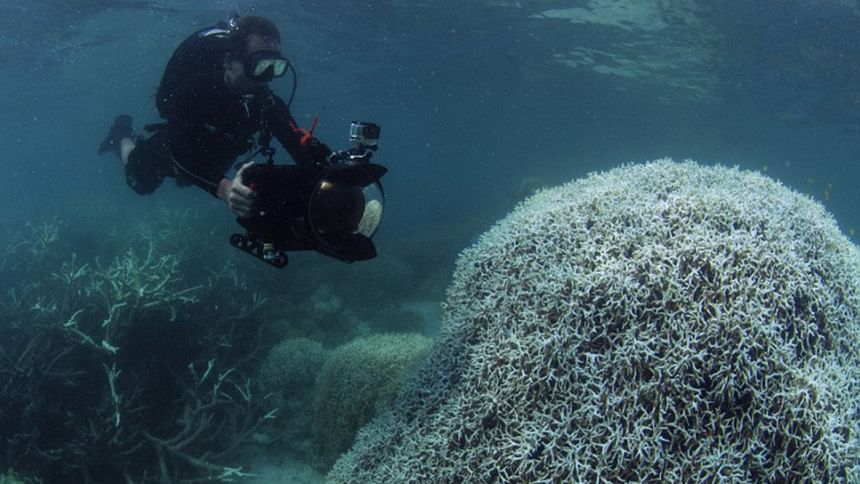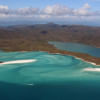Just 7% of Australia's Great Barrier Reef escapes bleaching

An extensive aerial and underwater survey has revealed that 93% of Australia's Great Barrier Reef has been affected by coral bleaching.
This follows earlier warnings that the reef was experiencing its worst coral bleaching event on record.
Prof Terry Hughes from the National Coral Bleaching Taskforce told the BBC the link between bleaching and global warming was "very well established".
Rising water temperatures cause corals to drive out colour-giving algae.
The corals can die if conditions do not return to normal.
The taskforce's survey shows that the extent of the damage is most severe in the northern section of the 2,300km (1,429 mile)-long reef, which lies off the cost of Queensland state.
Only 7% of the reef showed no signs of bleaching, Prof Hughes said.
The effects of El Nino, as well as climate change, are being blamed for the rise in sea temperatures that causes the bleaching.
More than 900 individual reefs were surveyed using a light plane and a helicopter, with the accuracy of the aerial survey then checked by teams of scuba divers.
"I'm inherently an optimist, but I think we have a rapidly narrowing window of opportunity to save the Great Barrier Reef," Prof Hughes said.
"If we don't take action on global warming it will become more degraded.
"After three bleaching events the mix of coral species has already changed."
This bleaching event is far more severe than previous bleaching events recorded in 2002 and 1998, he said.
"We know that this time only 7% of the reef didn't bleach. It was closer to 40% in the other two events.
"If these events start coming as frequently as every five to 10 years there will not be sufficient coral regeneration," he said.
Tourism to the Great Barrier Reef generates $A5bn ($3.9b, £2.7bn) each year and employs around 70,000 people, the National Coral Bleaching Taskforce said.
"Thankfully many parts of the reef are still in excellent shape," said Daniel Gschwind, chief executive of the Queensland Tourism Industry Council in a statement.
"But we can't just ignore coral bleaching and hope for a swift recovery."
The current worldwide bleaching event, which is also affecting reefs on Australia's north-west coast, is predicted to be the worst on record.
The Australian Department of Environment previously said that state and federal governments were investing a projected A$2bn over the next decade to protect the reef.

 For all latest news, follow The Daily Star's Google News channel.
For all latest news, follow The Daily Star's Google News channel. 








Comments